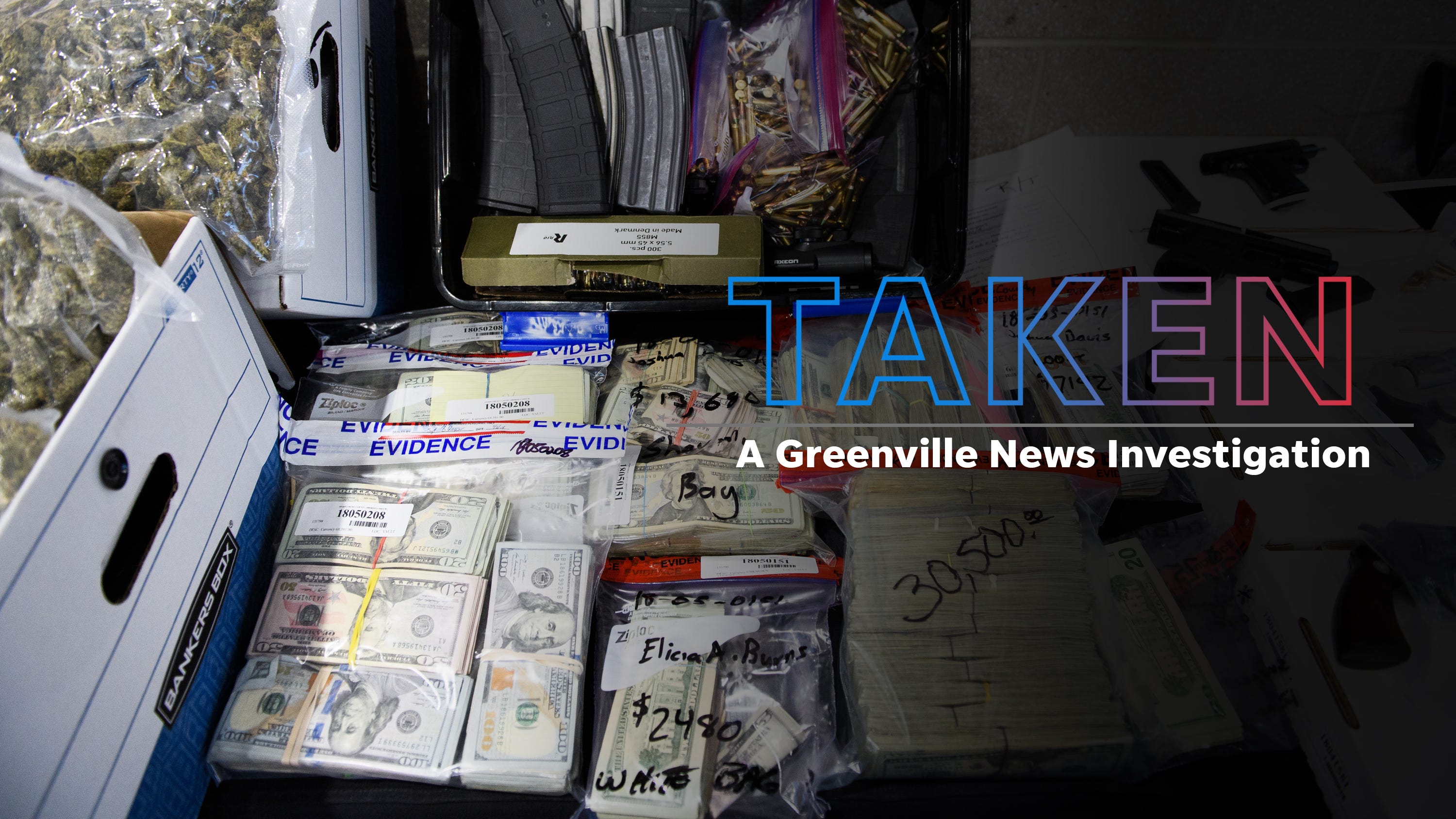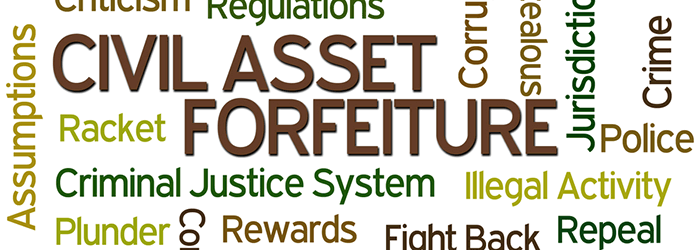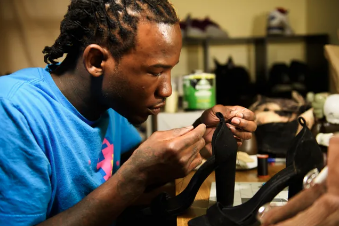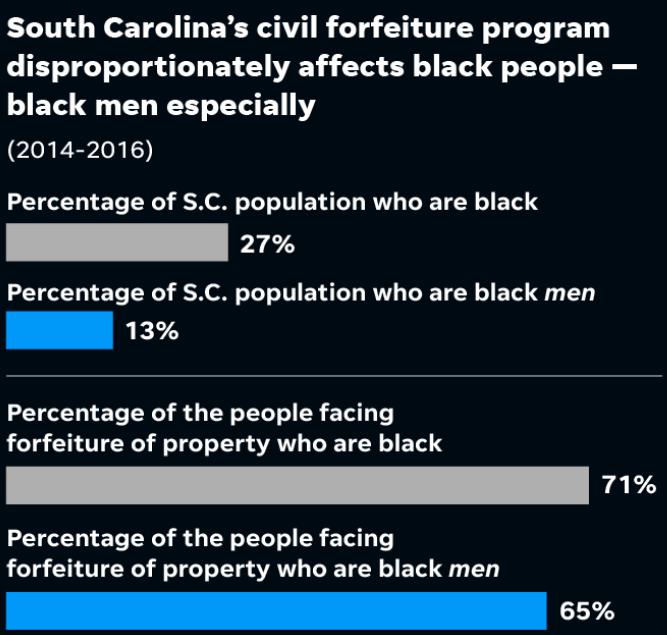LEGALIZED THEFT: Civil Asset Forfeiture Out of Control in America
TAKEN: How police departments make millions by seizing property
Anna Lee and Nathaniel Cary and Mike Ellis, The Greenville News
When a man barged into Isiah Kinloch’s apartment and broke a bottle over his head, the North Charleston resident called 911. After cops arrived on that day in 2015, they searched the injured man’s home and found an ounce of marijuana.
So they took $1,800 in cash from his apartment and kept it.
______
When Eamon Cools-Lartigue was driving on Interstate 85 in Spartanburg County, deputies stopped him for speeding. The Atlanta businessman wasn’t criminally charged in the April 2016 incident. Deputies discovered $29,000 in his car, though, and decided to take it.
______
When Brandy Cooke dropped her friend off at a Myrtle Beach sports bar as a favor, drug enforcement agents swarmed her in the parking lot and found $4,670 in the car.
Her friend was wanted in a drug distribution case, but Cooke wasn’t involved. She had no drugs and was never charged in the 2014 bust. Agents seized her money anyway.
She worked as a waitress and carried cash because she didn’t have a checking account. She spent more than a year trying to get her money back.
______
The Greenville News and Anderson Independent Mail examined these cases and every other court case involving civil asset forfeiture in South Carolina from 2014-2016.
Our examination was aimed at understanding this little-discussed, potentially life-changing power that state law holds over citizens — the ability of officers to seize property from people, even if they aren’t charged with a crime.
The resulting investigation became TAKEN, a statewide journalism project with an exclusive database and in-depth reporting. It’s the first time a comprehensive forfeiture investigation like this has been done for an entire U.S. state, according to experts.
The TAKEN team scoured more than 3,200 forfeiture cases and spoke to dozens of targeted citizens plus more than 50 experts and officials. Additionally, the team contacted every law enforcement agency in the state.
This yielded a clear picture of what is happening: Police are systematically seizing cash and property — many times from people who aren’t guilty of a crime — netting millions of dollars each year. South Carolina law enforcement profits from this policing tactic: the bulk of the money ends up in its possession.
The intent is to give law enforcement a tool to use against nefarious organizations by grabbing the fruits of their illegal deeds and using the proceeds to fight more crime.
Officers gather in places like Spartanburg County for contests with trophies to see who can make the largest or most seizures during highway blitzes. They earn hats, mementos and free dinners, and agencies that participate take home a cut of the forfeiture proceeds.
That money adds up. Over three years, law enforcement agencies seized more than $17 million, our investigation shows.
“We’ve heard so many awful stories,” said Hilary Shelton, director of the NAACP’s Washington bureau. “Having cash makes you vulnerable to an illicit practice by a police organization.
“It’s a dirty little secret. It’s so consistent with the issue of how law enforcement functions. They say, ‘Oh yeah, we want to make sure that resources used for the trafficking of drugs are stopped’ … but many of the people they are taking money from are not drug traffickers or even users.”
These seizures leave thousands of citizens without their cash and belongings or reliable means to get them back. They target black men most, our investigation found — with crushing consequences when life savings or a small business payroll is taken.
Many people never get their money back. Or they have to fight to have their property returned and incur high attorney fees.
Police officials respond by saying forfeiture allows them to hamstring crime rings and take money from drug dealers, a move they say hurts trafficking more than taking their drugs.
In 2016, when a Myrtle Beach police unit broke up a sophisticated drug ring called the 24/7 Boyz that offered a dispatch system to order drugs and have them delivered on demand, the police used seizure powers. They took cars, firearms, a four-bedroom house and $80,000. They also arrested 12 people.
Fifteenth Circuit Solicitor Jimmy Richardson initially prosecuted the case before turning it over to the federal government. In January, 10 of the 12 defendants pleaded guilty to drug conspiracy charges.
Richardson said taking a drug ring’s operating cash strikes a critical blow against traffickers in a way that criminal charges don’t. “A drug enterprise is an onion, it’s a multitude of layers,” he said. “Some tools hurt the traffickers, some hurt the enterprise itself. I feel this hurts the enterprise.”

Bobby Gore in his automotive shop in Nichols in 2018. He was putting his business and life back together after police seized cash from him.
LAUREN PETRACCA/GREENVILLE NEWS
Agencies also said funding for their work would be imperiled without the profit from this tool. Clemson Police Chief Jimmy Dixon said losing those profits could shut down his agency’s K-9 unit entirely. Undercover narcotics operations overall would suffer, Dixon said, citing limits on the department’s operating budget.
• Black men pay the price for this program. They represent 13 percent of the state’s population. Yet 65 percent of all citizens targeted for civil forfeiture in the state are black males.
“These types of civil asset forfeiture practices are going to put a heavier burden on lower-income people,” said Ngozi Ndulue, recently a national NAACP senior director, now working at the Death Penalty Information Center. “And when you add in racial disparities around policing and traffic stops and arrest and prosecution, we know this is going to have a disproportionate effect on black communities.”
• If you are white, you are twice as likely to get your money back than if you are black.
• Nearly one-fifth of people who had their assets seized weren’t charged with a related crime. Out of more than 4,000 people hit with civil forfeiture over three years, 19 percent were never arrested. They may have left a police encounter without so much as a traffic ticket. But they also left without their cash.
Roughly the same number — nearly 800 people — were charged with a crime but not convicted.
Greenville attorney Jake Erwin said the overarching idea is that the money being seized is earnings from past drug sales, so it’s fair game. “In theory, that makes a little bit of sense,” he said. “The problem is that they don’t really have to prove that.”
In some states, the suspicions behind a civil forfeiture must be proven beyond a reasonable doubt in court, but there is no requirement of proof in South Carolina. When a forfeiture is contested, prosecutors only have to show a preponderance of evidence to keep seized goods.
Police don’t just seize cash.
Practically anything can be confiscated and sold at auction: jewelry, electronics, firearms, boats, RVs. In South Carolina, 95 percent of forfeiture revenue goes back to law enforcement. The rest is deposited into the state’s general fund.

Law enforcement officers search a vehicle on Interstate 85 during Operation Rolling Thunder in Spartanburg County on May 1, 2018.
JOSH MORGAN/STAFF
• Most of the money isn’t coming from kingpins or money laundering operations. It’s coming from hundreds of encounters where police take smaller amounts of cash, often when they find regular people with drugs for personal use. Customers, not dealers. More than 55 percent of the time when police seized cash, they took less than $1,000.
• Your cash or property can disappear in minutes but take years to get back. The average time between when property is seized and when a prosecutor files for forfeiture is 304 days, with the items in custody the whole time. Often, it’s far longer, well beyond the two-year period state law allows for a civil case to be filed. But only rarely are prosecutors called out for missing the filing window and forced to return property to owners.
• The entire burden of recovering property is on the citizens, who must prove the goods belong to them and were obtained legally. Since it’s not a criminal case, an attorney isn’t provided. Citizens are left to figure out a complex court process on their own. Once cases are filed, they have 30 days to respond. Most of the time, they give up.
More: Hospital called police, who seized man’s money
More: She gave her friend a ride and lost her wages
• The bulk of forfeited money finances law enforcement, but there’s little oversight of what is seized or how it’s spent. Police use it to pay for new guns and gear, for training and meals and for food for their police dogs. In one case, the Spartanburg County sheriff kept a top-of-the-line pick-up truck as his official vehicle and sold countless other items at auctions.
In many other places, changes are being made: 29 states have taken steps to reform their forfeiture process. Fifteen states now require a criminal conviction before property can be forfeited, according to the Institute for Justice, a non-profit libertarian law firm.
South Carolina lawmakers have crafted reform bills in recent General Assembly sessions, but none of the efforts made it out of committee.
“The robber didn’t get anything, but the police got everything.”
To critics, South Carolina is the poster child for the injustice inherent in the for-profit civil forfeiture system, said Louis Rulli, a law expert at the University of Pennsylvania.
Forfeiture doesn’t square with the rest of the justice system, Rulli said. “How could it be possible that my property could be taken when I am not even charged with any criminal offense? It seems un-American,” he said.
Those who pay the biggest price are black men. Men like Kinloch. While he was hospitalized for a head injury from a home intruder, North Charleston police removed money from the tattoo artist’s apartment.
That department earns 12 percent of their annual operating budget from cash and property seized under civil law, our investigation shows.
“The robber didn’t get anything, but the police got everything,” said the 28-year-old Kinloch.
Police charged him with possession with intent to distribute after finding the marijuana in his apartment, but the charge was dismissed.
Kinloch never got his cash back.
Rent was due.
Without his $1,800, he couldn’t pay the landlord and was forced out of his home.
More: He fought off a robber, but police seized his $1,800
—
Kinloch isn’t alone as a black man facing forfeiture over small, or nonexistent, criminal charges in South Carolina. Our investigation found that black men make up the largest share by far of people targeted for civil forfeiture, much higher than even the drug arrest or incarceration rate for black men. Read about our exclusive findings here:

Johnnie Grant plays with daughter Alayna in 2018. He is putting his life back together after a lot of personal challenges recently
JOSH MORGAN/STAFF
Black men pay the price for SC civil forfeiture program
Atlanta musician Johnnie Grant jerked awake in the back seat as blue lights flashed and a Greenville sheriff’s deputy leaned in to question his driver.
Grant, his photographer and a videographer were on their way to a show in Charlotte in March 2017.
The deputy picked out his target among hundreds of cars that pass through the stretch of Interstate 85 near White Horse Road every hour. He said he pulled over the rented Chevrolet Malibu and its three black occupants for following too closely.
He and other deputies soon asked the men to step out of the car, searched it and found 1.5 ounces of marijuana inside a jar in the videographer’s backpack.
When deputies opened Grant’s bag, they found $8,000 wrapped in rubber bands. All three were charged with marijuana possession, even though the videographer explained it was his personal stash. The deputies took Grant’s cash and told him it was drug money.
“If I’d have been white, I guarantee you they wouldn’t have taken my money,” the 30-year-old Grant said. “They probably wouldn’t have even searched my car. They probably wouldn’t have even pulled me over.”
It fits the pattern. Black men carry the burden of South Carolina’s civil forfeiture program. Almost two-thirds of people targeted by forfeiture are black males, according to TAKEN investigation data analysis. Yet they represent just 13 percent of the general population.
Hilary Shelton, the NAACP Washington bureau director, said the organization worries the racial targeting in South Carolina is even worse than has been reported.
“Civil asset forfeiture, combined with the historic and consistent problems of racial profiling on our highways and byways, becomes very much part of a troubling equation,” he said. “It’s been used in a racially discriminatory manner. The law must be fully reviewed.”
South Carolina’s legal legacy
The state has a long history of racial discrimination related to property.
Civil forfeiture is a vestige of that history, some critics say. It links to an established trend of targeted law enforcement that puts more police in contact with non-whites, an exposure that can lead to civil forfeiture, experts say.
Some departments have built a money-making machine on the backs of this type of targeting.
It starts with where police use forfeiture. It’s happening in every urban environment in South Carolina. There are only six cities in the state with a population over 50,000. All of them frequently use forfeiture.
In smaller towns, only about half the police forces use the tool at all, and most agencies don’t pursue many cases.
The system is designed to be applied at scale. The more forfeiture is used, the more money police have at their disposal for equipment, training and for undercover drug purchases.
Though the racial disparities in the data exist broadly across the state, the decisions that lead to civil forfeiture are situational. It’s a traffic stop, or a drug investigation that leads to a residence, or increased patrols in low-income or historically black neighborhoods.
The TAKEN team used census data to analyze the widest disparities between the number of forfeiture cases with black subjects compared with the number of black residents in an agency’s jurisdiction.
The largest racial gaps? The highest disproportionate targeting of black people came from the Myrtle Beach Police Department, followed by the Lexington County Sheriff’s Office and the Charleston Police Department.
During 2014-2016, there was one black person targeted for forfeiture by Myrtle Beach police for every 50 black residents who live there. If you roughly extrapolated that rate over a generation, one in five black people would have money or goods taken by police in Myrtle Beach at some point over three decades, despite the fact that the city is mostly white.
The city is 69 percent white and just 14 percent black, according to 2014 U.S. Census data.
In Greenville County, black people were targeted for forfeiture at a rate of one per every 587 black residents during our three-year study period.
In comparison, forfeiture affected one white person per every 4,139 white residents in the county. Greenville County is 69 percent white and 19 percent black, according to U.S. Census data.
“It just sort of reinforces an understanding we already knew — that black residents disproportionately come in contact with law enforcement given the way criminal justice policy is oriented in this country,” said Nicole Porter, spokeswoman at The Sentencing Project, a reform advocacy group.
One reason: Traffic stops

A piece of this policing story is tied to the highway and police behavior and assumptions.
In one case, a Wellford officer pulled over a black man on Interstate 85 for what he said was failure to maintain a lane. When he discovered cash in the car that day in 2012, the officer called in the top Homeland Security agent in Greenville to help seize it. They’d found what police said were “marijuana particles.”
The North Carolina driver, Lee Harris Jr., said it was tobacco. The officers took $7,008 from the glove box.
“I call them pirates,” said Lee Harris Sr., the driver’s father. The elder Harris is a minister and a military veteran who said the money comes from his bank and from documented Social Security and benefits.
Harris said he had left $7,000 in the car when his son went on a trip to Atlanta. He filed a lawsuit, and after a year-and-a-half, he settled. The government kept $2,008 even though Harris’ son was never charged with a crime.
Sometimes police seize cash when the driver is merely ticketed for a minor violation not related to drugs, according to court records.
Ramando Moore was cited for having an open container in Richland County in 2015; he lost $604.
Plexton Denard Hunter was pulled over for a seatbelt violation in 2015 in Richland County and had $541 seized. Tesla Carter, another seatbelt violation, this time in Anderson in 2015. She lost $1,361.
If you’re black and driving in South Carolina, you are more likely to be stopped by police. In 24 states with available race data by traffic stop, the state had the second highest rate of black motorists stopped by state troopers, according to a 2017 study by the Stanford Open Policing Project.
In Greenville County, there were 24 state patrol stops for every 100 black residents of driving age. There were only 15 stops for every 100 white residents in the nine-year study period, according to the project.
Officers have a lower threshold to search black drivers than white drivers, the Stanford research shows, evidenced by data that revealed when officers searched drivers, they found contraband more often on white drivers than black ones.
Yet the scope of action taken by law enforcement and the justice system against black Americans throughout U.S. history makes it easier for an officer to take from a black person than a white person, said Heather Ann Thompson, a criminal justice and African-American history professor at the University of Michigan and author of “Blood in the Water.”
Part 2 of TAKEN: How civil forfeiture errors, delays enrich SC police, hurt people
It’s the same reason black people are prosecuted more harshly, are incarcerated more often and for longer sentences and face civil fines and penalties more often than whites. They’re just not as likely to be able to marshal resources to fight back against the justice system, she said.
“It has everything to do with who has access to good defense lawyers and who’s getting pulled over to begin with,” said Thompson, who’s a leading voice in criminal justice reform.
The racial disparity may begin with traffic stops, but it extends well beyond them in South Carolina.
A policing system built to target minorities

Ella Bromell sits in her home in Conway on Feb. 21, 2018. These days, she rarely leaves her yard
LAUREN PETRACCA/GREENVILLE NEWS
How often are black people in this state the victim of civil forfeiture when the police encounter doesn’t involve being pulled over in a car?
Excluding known traffic stops, police seized money from black people in two-thirds of all cases compared with one-third for whites, our TAKEN data analysis shows. It’s an even more startling fact when considering South Carolina is 69 percent white.
Ella Bromell, a 72-year-old widow from Conway, twice nearly lost her home, though she’s never been convicted of a crime in her life.
Yet the city of Conway nearly succeeded in seizing her house because they said she didn’t do enough to stop crime happening on the sidewalk and in her yard. Young men were using her lawn as a location to sell drugs at night, according to court records.
The fight between Conway officials and Bromell, who is black, began in 2007 and lasted a decade — culminating in court in 2017 when two judges sided with her and wrote that the city “failed to produce any evidence that the residence was an integral or otherwise fundamental part of illegal drug activity.”
Still, Bromell fears the city will try again, despite the police admission in court that they couldn’t say if she was even aware of a single drug sale around her house.
Conway City Manager Adam Emrick said the city has contemplated future seizures in the case of Bromell or similar property owners.
Losing her home would be the end of her, Bromell said. “I don’t want to go nowhere else.”
Thurmond Brooker, Bromell’s attorney, said the law is being warped without the public even noticing. “It’s being used in a way in which innocent people can have their property taken,” he said. “Little old ladies whose property is being trespassed upon can be victimized for a second time.”
Why are black citizens like Bromell facing forfeiture more often than their white neighbors?
One police official said it’s because there’s more drug crime in the black community.
“We go where we’re called,” Greenville Police Chief Ken Miller said. “We police where people are telling us there are problems. We’re not an agency — and I don’t know a police agency — that tries to balance racially its interdiction of drugs off the street.”
The bulk of the drugs and weapons calls the city receives are in minority communities, Miller said. He said he won’t apologize if police tactics disproportionately engage black men and lead to more seizures.
In Greenville County, the Sheriff’s Office initiated 256 forfeiture cases from 2014-2016, of which 150 involved blacks and 85 involved whites.
Greenville city police had 89 cases. Of those, 53 involved blacks and 22 involved whites.
Miller said the city has spent time and money on racial bias training and is working to better track data on traffic stops.

David Smith, one of the architects of the expanded forfeiture laws enacted in the 1980s to fight the War on Drugs, said it’s a great tool for going after significant criminals. Drug lords. White collar masterminds. But increasingly forfeiture has been co-opted by local police forces to take petty cash on the side of the road, he said.
Grant, the Atlanta musician, said he understands how police work and knew right away he would fight to get his money back, even if it cost him legal fees.
“They knew we were young, and we were black,” Grant said. “They pulled us over, gave us a bogus reason. We didn’t consent to search; they searched anyway.”
Grant’s drug charge was dismissed, and though he had proof that he earned his money legally — show schedules, payment receipts, contracts — it could have taken another two years before he could challenge the forfeiture in court. So Grant chose to settle rather than wait.
The state got $500. He got $7,500 back but had to pay his attorney $2,500.
His case was considered a good outcome.
“We’re the ones being railroaded,” Grant said. “It just speaks volumes to where we are as a people.”
More: For years, a SC city tried to seize a widow’s home. It still might.
More: Atlanta rapper fought the law and won
Enjoying the TAKEN investigation series? Please support local journalism by subscribing to The News.
Have you lost property through civil forfeiture? Or do you have information about the practice we should know? We’d like to hear about it. Or about any investigative tips we could work on. Contact our reporters at taken@greenvillenews.com.
______
Also, check out our Instagram content for TAKEN.
BACKGROUND: Journalists in the Greenville News and Anderson Independent Mail newsrooms spent two years on this investigative project. Here’s why.

Originally Published 11:47 p.m. EST Jan. 27, 2019


